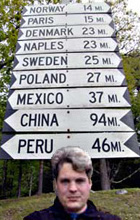 |
Subscribe to the blog

Find a Flight Consider a Consolidator Rent a Car Pick a Railpass Book a Vacation Reserve a Room Choose a Cruise Get Gear Wire Money
|
|
A Room to Call Your Own in Europe
Each time I've been adopted, I've had the time of my life. That night I stayed with an Irish woman in her Roscommon farmhouse, she excitedly helped me leaf through her dusty regional history tomes looking for the name of my great-grandmother, who had been a local schoolteacher. That time in Prague when I bunked in a Czech student's spare bedroom, he spent all evening detailing, in broken English, exactly what was wrong with modern capitalism while the two of us slowly drained his fridge of beer. But the cultural adventure of feeling like you've been adopted by a European family for a few days isn't the only reason to rent a room in a private home. It also costs about half what you would pay at the impersonal hotel down the street. Rates for two generally start around $50 in Europe's big cities—though $60 to $90 is more common. In smaller cities and towns, prices can drop to $30. (Just don't expect to pay these mom-and-pop operations with your Visa card; these transactions are cash-only.) The Rental Room Hunt
Becoming Part of the Family
There's no guarantee you'll be staying in that prototypical B&B: a huge Victorian mansion full of chintz and doilies. These days, just as many rental rooms are in modern city apartments or isolated farmhouses, but a friendly, homey atmosphere tends to prevail. Sometimes they'll ask, "Why don't you join us for dinner?" Other times, they'll just hand you the keys and ask you to try to be home by midnight. Still, in most cases you'll have more interaction with the owner and her family than with the desk clerk at a hotel. During a visit to Sicily's Egadi Islands, where the tuna industry is such an integral and ancient part of the culture that there are 10,000-year-old cave paintings of men hunting tuna, I rented a room from the widow of the man who had once managed the processing plant. My hostess regaled me with surprisingly interesting tuna-related facts that turned out to be relevant to the current state of affairs on the island, the ecology of the surrounding seas, and the future of Italy's economy. I also got a lesson in practical Italian economics: I was instructed to tell anyone I met that I was a friend of hers, just visiting, not a guest. Guests, you see, pay money while friends stay for free—at least as far as the tax man knows. I stayed two nights with my new friend. I never paid a bill, but to thank her for her "hospitality," I gave her a gift—which happened to be the local equivalent of about $25. She gave me a tin of tuna.Reid Bramblett is the founder of ReidsGuides.com Copyright © 2006 by Reid Bramblett This article was originally published in February of 2006. All information was accurate at the time. |
|
||||||||||||||||||||
|
|||||||||||||||||||||
|
|||||||||||||||||||||



